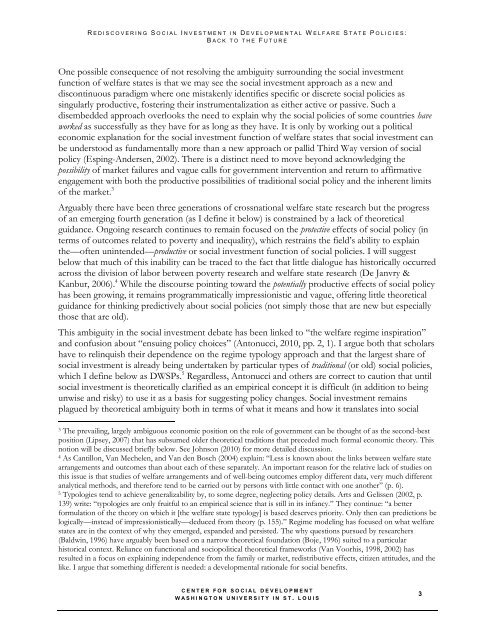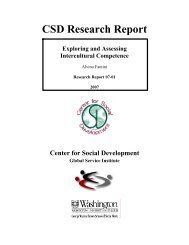Rediscovering social investment in developmental welfare state ...
Rediscovering social investment in developmental welfare state ...
Rediscovering social investment in developmental welfare state ...
Create successful ePaper yourself
Turn your PDF publications into a flip-book with our unique Google optimized e-Paper software.
R E D I S C O V E R I N G S O C I A L I N V E S T M E N T I N D E V E L O P M E N T A L W E L F A R E S T A T E P O L I C I E S :<br />
B A C K T O T H E F U T U R E<br />
One possible consequence of not resolv<strong>in</strong>g the ambiguity surround<strong>in</strong>g the <strong>social</strong> <strong><strong>in</strong>vestment</strong><br />
function of <strong>welfare</strong> <strong>state</strong>s is that we may see the <strong>social</strong> <strong><strong>in</strong>vestment</strong> approach as a new and<br />
discont<strong>in</strong>uous paradigm where one mistakenly identifies specific or discrete <strong>social</strong> policies as<br />
s<strong>in</strong>gularly productive, foster<strong>in</strong>g their <strong>in</strong>strumentalization as either active or passive. Such a<br />
disembedded approach overlooks the need to expla<strong>in</strong> why the <strong>social</strong> policies of some countries have<br />
worked as successfully as they have for as long as they have. It is only by work<strong>in</strong>g out a political<br />
economic explanation for the <strong>social</strong> <strong><strong>in</strong>vestment</strong> function of <strong>welfare</strong> <strong>state</strong>s that <strong>social</strong> <strong><strong>in</strong>vestment</strong> can<br />
be understood as fundamentally more than a new approach or pallid Third Way version of <strong>social</strong><br />
policy (Esp<strong>in</strong>g-Andersen, 2002). There is a dist<strong>in</strong>ct need to move beyond acknowledg<strong>in</strong>g the<br />
possibility of market failures and vague calls for government <strong>in</strong>tervention and return to affirmative<br />
engagement with both the productive possibilities of traditional <strong>social</strong> policy and the <strong>in</strong>herent limits<br />
of the market. 3<br />
Arguably there have been three generations of crossnational <strong>welfare</strong> <strong>state</strong> research but the progress<br />
of an emerg<strong>in</strong>g fourth generation (as I def<strong>in</strong>e it below) is constra<strong>in</strong>ed by a lack of theoretical<br />
guidance. Ongo<strong>in</strong>g research cont<strong>in</strong>ues to rema<strong>in</strong> focused on the protective effects of <strong>social</strong> policy (<strong>in</strong><br />
terms of outcomes related to poverty and <strong>in</strong>equality), which restra<strong>in</strong>s the field‘s ability to expla<strong>in</strong><br />
the—often un<strong>in</strong>tended—productive or <strong>social</strong> <strong><strong>in</strong>vestment</strong> function of <strong>social</strong> policies. I will suggest<br />
below that much of this <strong>in</strong>ability can be traced to the fact that little dialogue has historically occurred<br />
across the division of labor between poverty research and <strong>welfare</strong> <strong>state</strong> research (De Janvry &<br />
Kanbur, 2006). 4 While the discourse po<strong>in</strong>t<strong>in</strong>g toward the potentially productive effects of <strong>social</strong> policy<br />
has been grow<strong>in</strong>g, it rema<strong>in</strong>s programmatically impressionistic and vague, offer<strong>in</strong>g little theoretical<br />
guidance for th<strong>in</strong>k<strong>in</strong>g predictively about <strong>social</strong> policies (not simply those that are new but especially<br />
those that are old).<br />
This ambiguity <strong>in</strong> the <strong>social</strong> <strong><strong>in</strong>vestment</strong> debate has been l<strong>in</strong>ked to ―the <strong>welfare</strong> regime <strong>in</strong>spiration‖<br />
and confusion about ―ensu<strong>in</strong>g policy choices‖ (Antonucci, 2010, pp. 2, 1). I argue both that scholars<br />
have to rel<strong>in</strong>quish their dependence on the regime typology approach and that the largest share of<br />
<strong>social</strong> <strong><strong>in</strong>vestment</strong> is already be<strong>in</strong>g undertaken by particular types of traditional (or old) <strong>social</strong> policies,<br />
which I def<strong>in</strong>e below as DWSPs. 5 Regardless, Antonucci and others are correct to caution that until<br />
<strong>social</strong> <strong><strong>in</strong>vestment</strong> is theoretically clarified as an empirical concept it is difficult (<strong>in</strong> addition to be<strong>in</strong>g<br />
unwise and risky) to use it as a basis for suggest<strong>in</strong>g policy changes. Social <strong><strong>in</strong>vestment</strong> rema<strong>in</strong>s<br />
plagued by theoretical ambiguity both <strong>in</strong> terms of what it means and how it translates <strong>in</strong>to <strong>social</strong><br />
3 The prevail<strong>in</strong>g, largely ambiguous economic position on the role of government can be thought of as the second-best<br />
position (Lipsey, 2007) that has subsumed older theoretical traditions that preceded much formal economic theory. This<br />
notion will be discussed briefly below. See Johnson (2010) for more detailed discussion.<br />
4 As Cantillon, Van Mechelen, and Van den Bosch (2004) expla<strong>in</strong>: ―Less is known about the l<strong>in</strong>ks between <strong>welfare</strong> <strong>state</strong><br />
arrangements and outcomes than about each of these separately. An important reason for the relative lack of studies on<br />
this issue is that studies of <strong>welfare</strong> arrangements and of well-be<strong>in</strong>g outcomes employ different data, very much different<br />
analytical methods, and therefore tend to be carried out by persons with little contact with one another‖ (p. 6).<br />
5 Typologies tend to achieve generalizability by, to some degree, neglect<strong>in</strong>g policy details. Arts and Gelissen (2002, p.<br />
139) write: ―typologies are only fruitful to an empirical science that is still <strong>in</strong> its <strong>in</strong>fancy.‖ They cont<strong>in</strong>ue: ―a better<br />
formulation of the theory on which it [the <strong>welfare</strong> <strong>state</strong> typology] is based deserves priority. Only then can predictions be<br />
logically—<strong>in</strong>stead of impressionistically—deduced from theory (p. 155).‖ Regime model<strong>in</strong>g has focused on what <strong>welfare</strong><br />
<strong>state</strong>s are <strong>in</strong> the context of why they emerged, expanded and persisted. The why questions pursued by researchers<br />
(Baldw<strong>in</strong>, 1996) have arguably been based on a narrow theoretical foundation (Boje, 1996) suited to a particular<br />
historical context. Reliance on functional and sociopolitical theoretical frameworks (Van Voorhis, 1998, 2002) has<br />
resulted <strong>in</strong> a focus on expla<strong>in</strong><strong>in</strong>g <strong>in</strong>dependence from the family or market, redistributive effects, citizen attitudes, and the<br />
like. I argue that someth<strong>in</strong>g different is needed: a <strong>developmental</strong> rationale for <strong>social</strong> benefits.<br />
C E N T E R F O R S O C I A L D E V E L O P M E N T<br />
W A S H I N G T O N U N I V E R S I T Y I N S T . L O U I S<br />
3
















